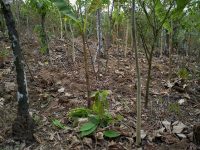
The Food and Agriculture Organization of the UN (FAO) has released two publications focused on boosting agriculture’s contribution to the achievement of the Paris Agreement on climate change. The Organization launched the resources in conjunction with the UN Climate Change Conference in Bonn, Germany.
Leading up to the UN Climate Change Conference (COP 23), FAO Director-General José Graziano da Silva noted the importance of addressing both agriculture’s emissions as well as the worldwide impacts that climate change will have on food security and nutrition. He called for integrating climate change mitigation and adaptation across the entire food system. With regard to agriculture, da Silva said, “much more needs to be done to reduce these emissions and to simultaneously improve yields and build resilience.”
To help meet these needs, on the occasion of the climate summit’s ‘Agriculture Action Day,’ FAO launched a resource titled, ‘Climate-Smart Agriculture Sourcebook.’ A second edition, the online sourcebook provides information on how to make agriculture more sustainable and productive while also reducing its climate impacts. According to FAO, the second edition adds new modules addressing climate change adaptation and mitigation, integrated production systems, knowledge-support systems for rural producers, the role of gender, and how to improve implementation.
FAO also launched a report titled, ‘Tracking adaptation in agriculture sectors: Climate change adaptation indicators.’ The publication presents a “framework and methodology for Tracking Adaptation in Agricultural Sectors (TAAS) at the national level.” Looking at adaptation processes across agricultural sub-sectors, the document analyzes the interrelationships between four categories of indicators: natural resources and ecosystems; agricultural production systems; socio-economics; and institutional and policy systems that drive adaptation processes and outcomes.
On outcomes related to agriculture from COP 23, including the COP’s decision on agriculture, da Silva noted that, “it will help create an enabling environment for countries and non-state actors to conduct activities in the agricultural sectors that are key to achieve the objectives of the Paris Agreement.”
The COP decision invites parties to submit, to UNFCCC subsidiary bodies, information on, inter alia: soil carbon, soil health and soil fertility under grassland and cropland as well as integrated systems, including water management; improved nutrient use and manure management towards sustainable and resilient agricultural systems; improved livestock management systems; and the socioeconomic and food security dimensions of climate change in the agricultural sector.





